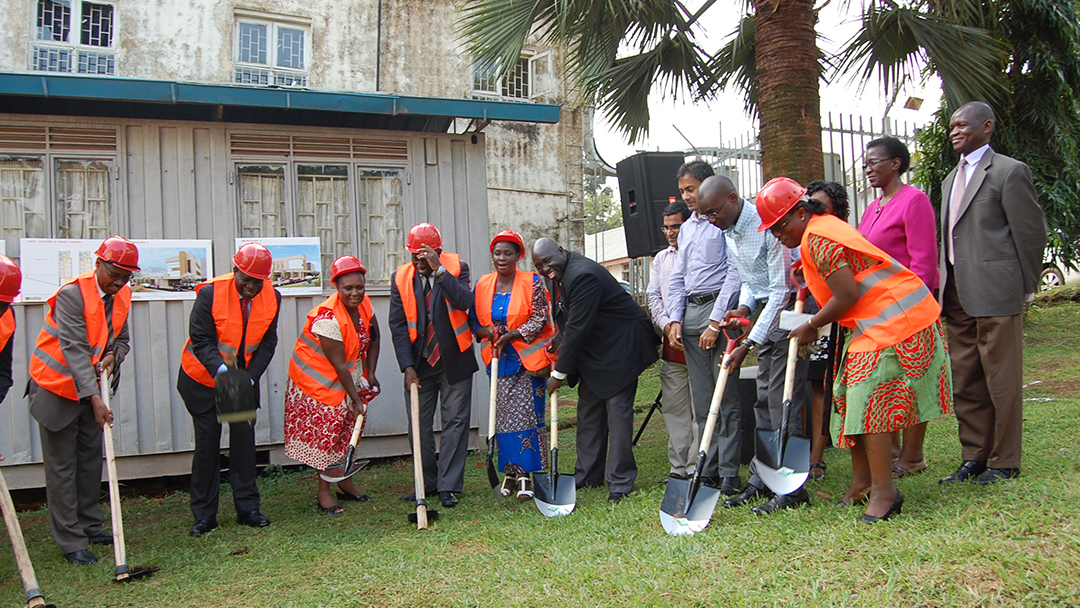ARISE
The Africa Research Initiative and Support Network consortium

Objective
The objective of the ARISE (Africa Research Initiative and Support) consortium is to strengthen research and development capacity by developing a network of Research Support & Training Centers (RSTCs) in sub-Saharan Africa. The ARISE consortium, funded by the Ministry of Foreign Affairs in the Netherlands, was founded in 2012.
Description
In 2012 the ARISE (Africa Research Initiative and Support–Network) consortium was founded as a joint venture of the existing COMMAL (College of Medicine–Malawi Amsterdam Liverpool) and INTERACT (Infectious diseases Network for Treatment and Research in Africa) programs. These programs, funded by the Ministry of Foreign Affairs in the Netherlands, were initiated in 2005 with the general objective to strengthen the sub-Saharan African research and development capacity in the field of poverty-related diseases (HIV, TB and malaria). The ministry decided to extend the funding for a period of four years (June 2012 to October 2016) with the prime focus on consolidation of capacity built under the first phase of the program.
The main focus areas of the ARISE consortium are:
- To consolidate and improve research capacity within four regional RSTCs at universities in Malawi, Rwanda, Zimbabwe and Uganda by synchronizing and twinning the success models for training and research capacity strengthening of the COMMAL and INTERACT programs;
- To develop a coherent functional capacity building network of RSTCs with harmonized training methodology, international accreditation and a standardized evaluation system. This includes capacity sharing of PhD training and supervision;
- To further develop the individual RSTCs into units capable of addressing national health problems as they emerge and delivering a service portfolio based on research disciplines. This includes the establishment of necessary infrastructure for the individual RSCTs to house the different ingredients of the RSTC model; and
- To further strengthen capacity in the field of grants and administration, data and IT management and improve communication strategies with the aim of increased know-how, income and visibility, ultimately resulting in financial independence not enforced by donor funding.
An African network will help with focusing and forwarding research agendas of regional relevance. While many health problems seem local at first glance, several of their elements are essentially of regional nature (e.g. disease epidemiology, organization of the health sector, rapid urbanization). Addressing these in a similar fashion in different African settings will bring important dimensions to health research projects. African research networks will not only be essential for formulating research agendas in this respect, but also for attracting the funds necessary to carry out such projects.
An important aspect of the current success of the ARISE consortium is the growth in South-South collaboration between the various sites. By the end of 2013, the four RSTCs have been established within their respected host institutes in Zimbabwe, Uganda, Rwanda and Malawi. In Zimbabwe the construction of a new RSTC building is almost finished. The prime RSTC activities have been sub-divided into: Training & Courses; Support Services; and Governance & Infrastructure. With respect to Training, GCP training was started at all sites and CRA training was given in Malawi and planned in the other sites. With respect to the Support Services, a portfolio has been developed including epidemiological and statistical support; data and grant-management services and monitoring of randomized clinical trials. Research information services were started for students and staff of the host institutes through websites and regular newsletters.
Outcome
Four RSTCs were established in Zimbabwe, Uganda, Rwanda and Malawi. These RSTCs were integrated into their respective host institutes and their activities were often conducted in a South-South collaboration between network partners. The RSTC activities were grouped into three categories (work packages): 1) Training & Courses; 2) Support Services; and 3) Governance & Infrastructure. 1) Training & Courses: at all sites, a course portfolio was developed offering a range of courses: conduct of clinical research, biostatistics, evidence based medicine, data and grants management. Over the funding period more than 3,000 trainees attended the courses of whom the majority were students and faculty staff. 2) Support Services: the service package of epidemiological & statistical support; data and grant management support and monitoring of clinical trials was developed at all sites. These services benefitted students and staff members, but more importantly, it generally increased the quality of the research conducted at the host institutes. 3) Governance & Infrastructure, the RSTCs have been able to establish themselves in the centre of the research activities in their respective host institutes. They have made vital contributions to the development of research policies and guidelines. Through regular newsletters they have been able to become the source of research information for students and staff. This very successful NACCAP funded program has made significant contributions towards research capacity building in Africa and has shown that research ownership can be shifted from the west to the Sub Saharan host institutes.Publications
Research capacity development for Africa: Consolidation, Ownership and Independence
Partners
University of Malawi, College of Medicine, Malawi
University of Rwanda, College of Medicine, Rwanda
Makerere University, College of Health Sciences, Uganda
University of Zimbabwe, College of Health Sciences, Zimbabwe
Funders
NACCAP
Countries
Malawi
Rwanda
Uganda
Zimbabwe
